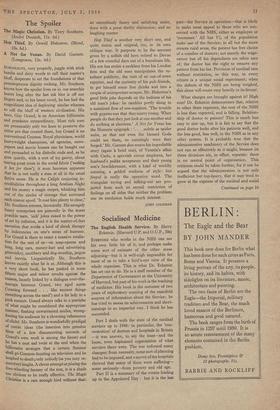The Spoiler
The Magic Christian. By Terry Southern. (Andre Deutsch, 1 ls. 6d.) SCHOOLBOYS, very properly, juggle with stink bombs and dirty words to call their master's bluff, desperate to set the foundations of that presumptuous dignity rocking. Mr. Southern knows how the spoiler lives on in our anarchic hearts long after the last ink blot is off our fingers and,-in his latest novel, he has had the magnificent idea of deploying similar wheezes to call the bluff of western civilisation. His hero, Guy Grand, is an American billionaire and prankster extraordinary. Most rich men are presumably only too keen to preserve the status quo that created them, but Grand is no conventional Croesus. Royal physicians, world heavyweight champions, ad agencies, news- papers and movie houses can be bought out and persuaded to his diabolic ends and, as he goes quietly, with a sort of icy gaiety, about tearing great rents in the social fabric ('Working tt hot for them'), it soon becomes apparent that he is not really a man at all in the usual fictive sense. He is the Caliph conjuring in- credibilities throughout a long Arabian Night and his money a magic carpet, whisking him out of the circles of outrage that surround each cosmic spoof. 'It cost him plenty to clear,' Mr. Southern intones, laconically. His savagely funny enterprises are generally in the worst possible taste, 'sick' jokes raised to the power of art by inflation, and it is the matter-of-fact narration that works a kind of shock therapy by indecencies on one's sense of humour. For Grand is there to enact a massive retalia- tion for the rest of us—on soap-operas and long, long cars, money-lust and advertising gimmickry, snobbery and dog-worship, jargon and inertia. Linguistically Mr. Southern knows exactly what he is at. Although this is s very short book, he has packed in some fifteen major and minor revolts against the masses, loosely linked by a dialogue over-the- teacups between Grand, two aged aunts ('craning forward . . . like ancient things stretching across the sand') and a fat lady in a pink sunsuit. Grand always talks in a pastiche of what might be considered the appropriate Manner, flashing unwarranted smiles, wrong- footing his audience by a clowning vehemence of cliché. Mr. Southern is wonderfully prodigal of comic ideas (the insertion into genuine films of a few disconcerting seconds of Grand's own work is among the finest) and he has a neat sad twist at the end when the billionaire arranges that a certain Senator shall go Commie-hunting on television and be laughed to death; only nobody (as you may re- member) laughs. A clever attempt at placing the free-wheeling fantasy of the rest, it is a shade too obvious to be really effective. The Magic Christian is a rare enough bird without that:
an enormously funny and satisfying satire, done with a great thrifty distinction; and no laughing matter.
Hop Thief is another very short one, and quite comic and original, too, in its own oblique way. It purports to be the account given by a selfish old bore retired to Devon of a few eventful days out of a humdrum life. His son has stolen a necklace from his London firm and the old man manipulates the re- sultant publicity, the visit of an out-of-town reporter, and the curiosity of his pub friends, to get himself some free drinks and into a couple of unimportant scrapes. Mr. Blakeston's good little joke depends on the badness of his old man's jokes: he rambles pertly along in a sustained flow of non-sequiturs. 'The trouble with gypsies was that they marry young. When people do that they just look at one another and do nothing at elections.' A Net for Venus has the Homeric epigraph : . . .subtle as spider webs, so that not even the blessed Gods could see them, so cunningly were they forged.' Mr. Garnett does weave his improbable story (again h brief one), of Venetia's affair with Carlo, a spivvish circus employee, her husband's pukka acceptance and their young son's bewilderment, with a kind of worldly cunning, a gelded coolness of style: but forged is really the operative word. The triangular toying and talking-out are pro- jected from such an unreal restriction of feelings on all sides that neither the problem nor its resolution holds much interest.
JOHN COLEMAN






























 Previous page
Previous page